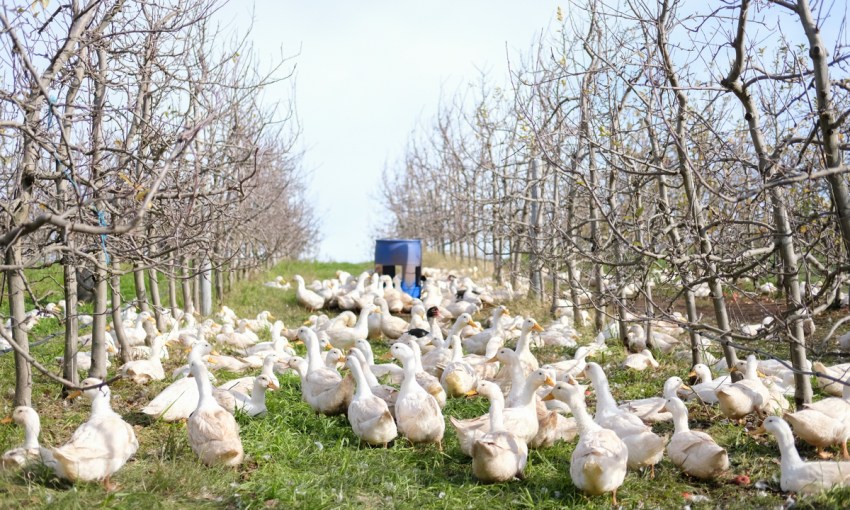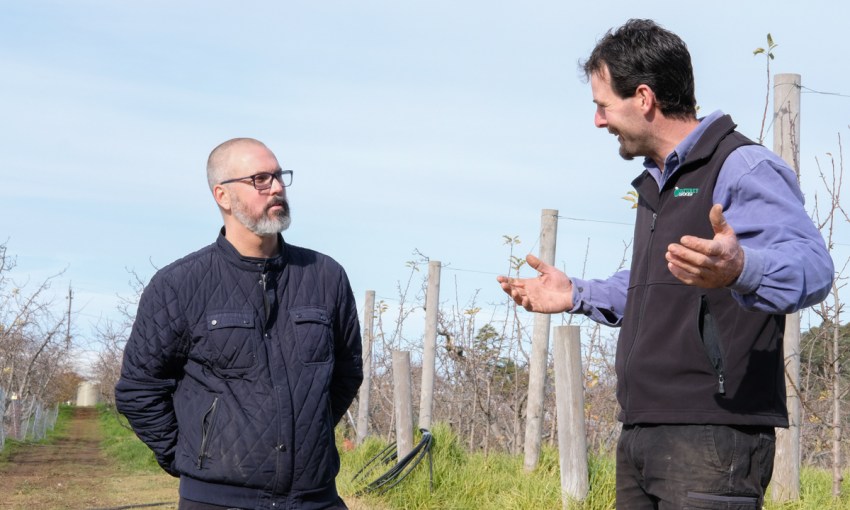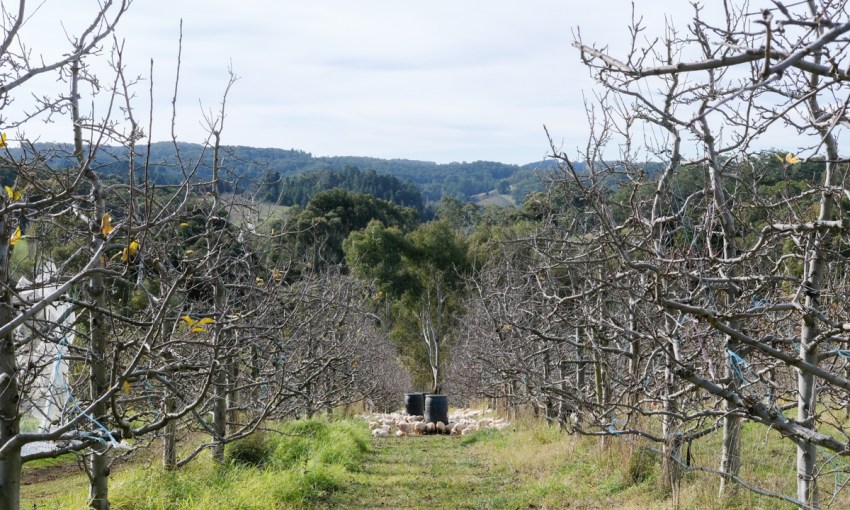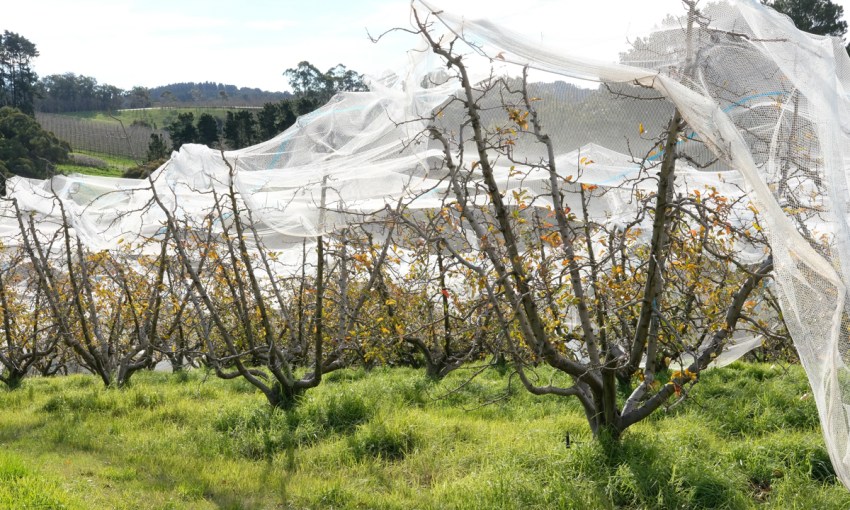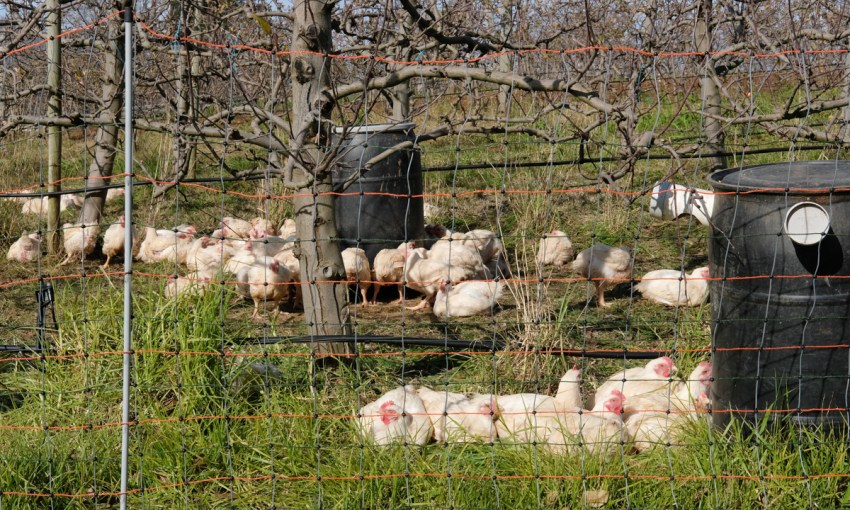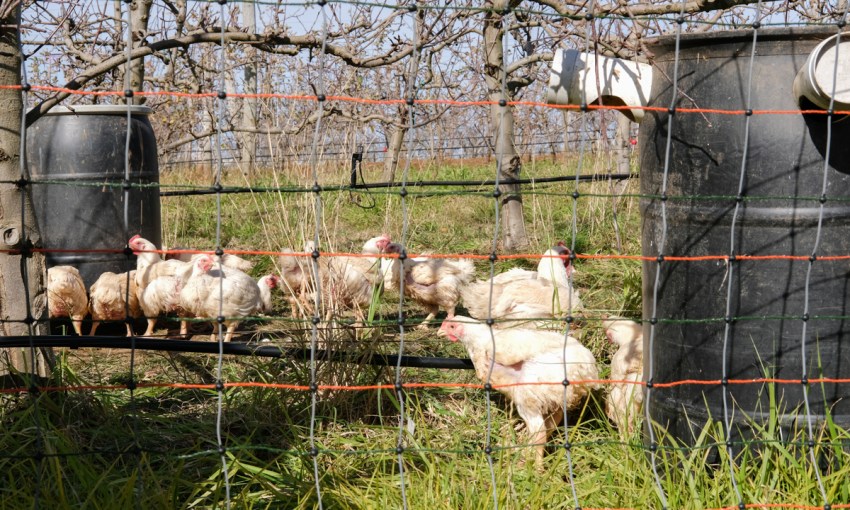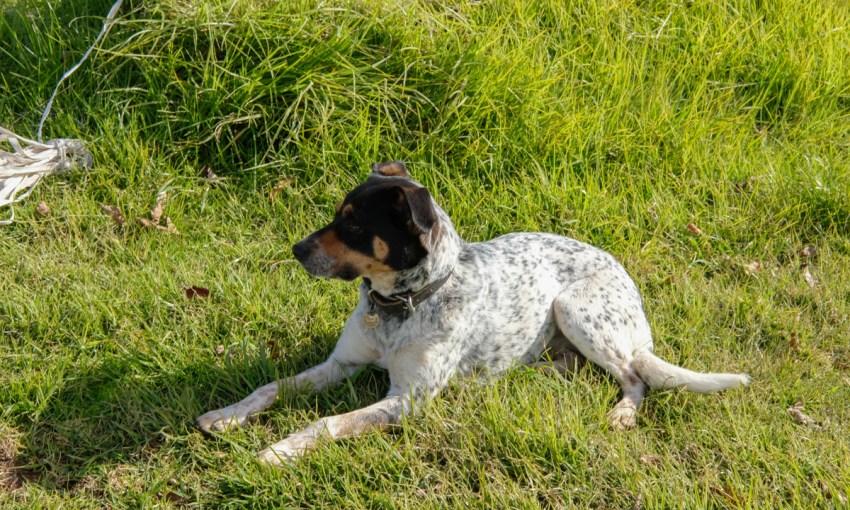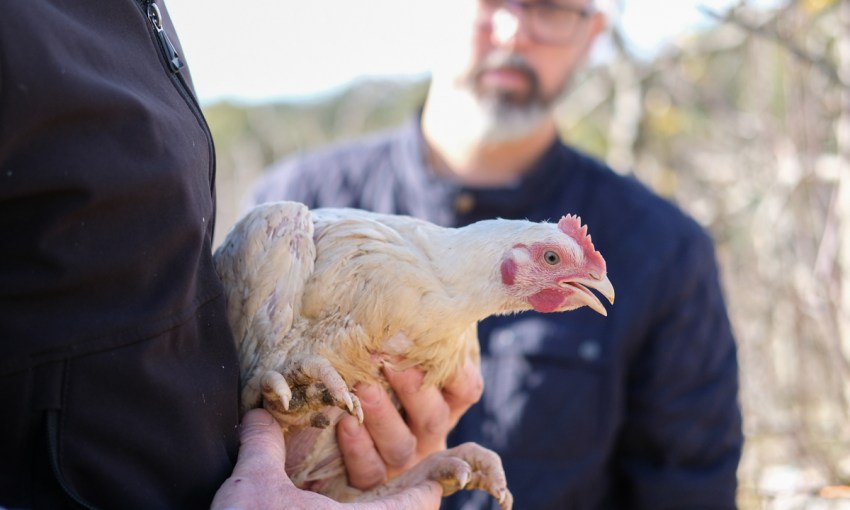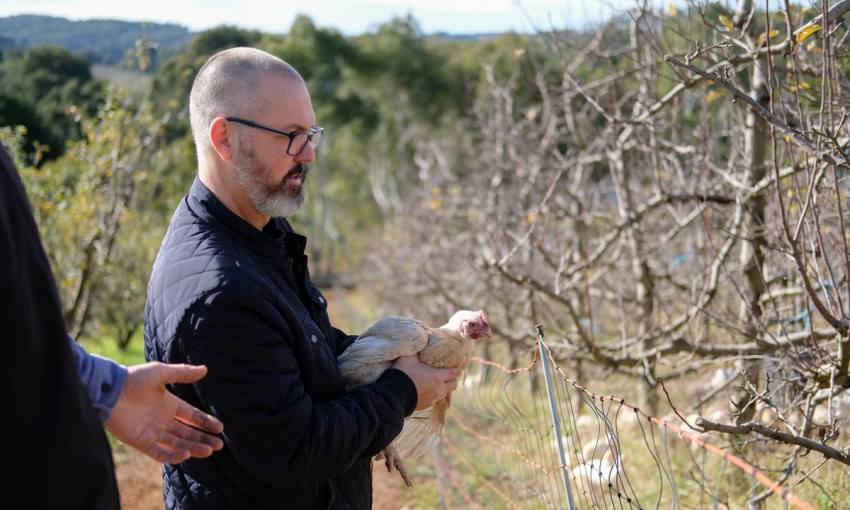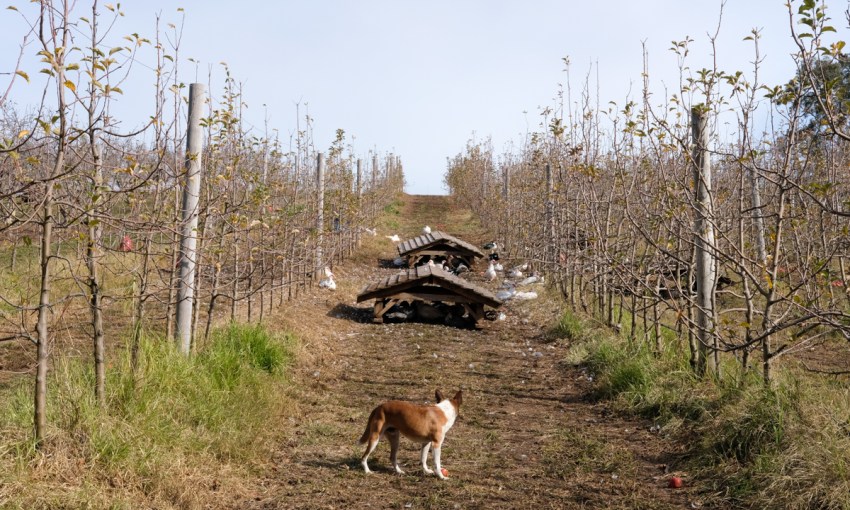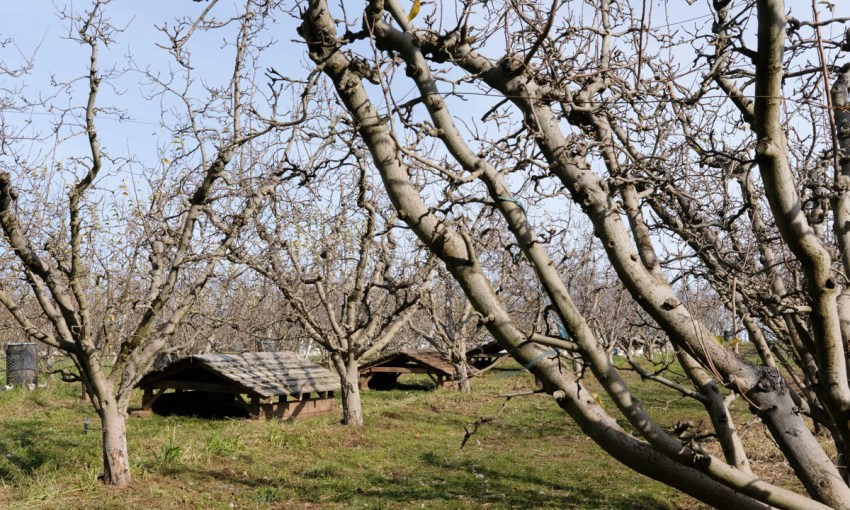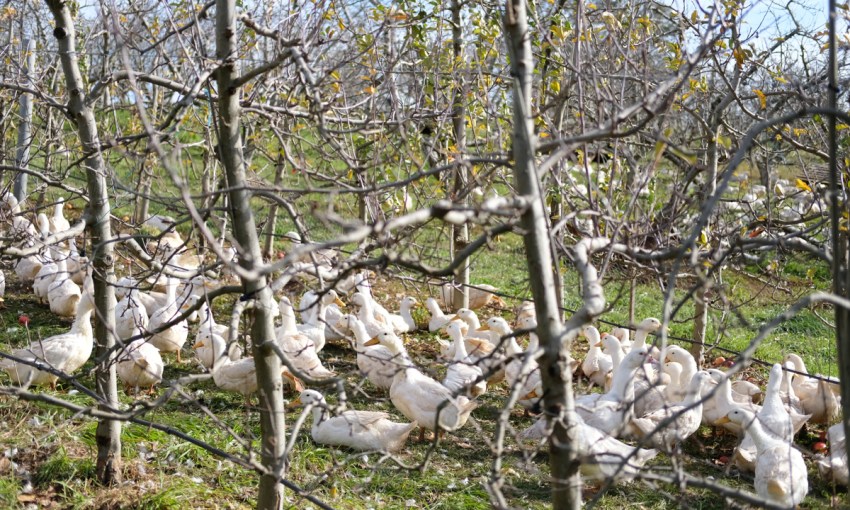CityMag takes a trip to the Hills with 2KW’s Head chef, Trent Lymn, to meet the producer behind one of the restaurant’s most popular dishes.
Farm to rooftop
Atop the roof at 2KW, during a Friday lunchtime service, head chef Trent Lymn operates beside the searing heat of the Josper oven, plating the third iteration of a dish implemented by former executive chef Dan Lawrence, refined to its current state by Trent: the shio koji chicken.
2KW Bar and Restaurant is located at level 8, 2 King William Street.
Opening hours:
Mon-Thurs: 10am-midnight
Fri-Sat: 10am-2am
Sun: midday-midnight
On the plate, it is a delectable mess of expertly broken down meat and crisped chicken skin sitting on a bed of miso tahini, presented as an example of how an often sidelined protein can be elevated to sit alongside any other premium cut.
There is a secret to this dish that lies outside the kitchen, and on a brisk winter Monday afternoon, CityMag meets with the chef at an apple orchard in Lenswood to find out more.
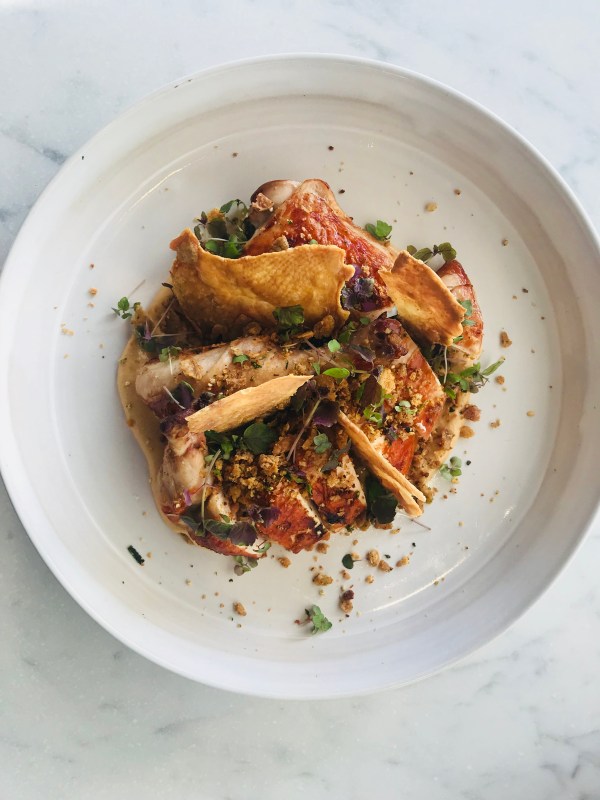
The shio koji chicken at 2KW. This image supplied.
“What I should have done, in hindsight, is gone and worked on a chicken farm for two weeks,” Carey Schultz laughs, thinking back on how he came to be a chicken farmer.
“You worked it out for yourself, basically, along the way?” Trent asks.
Carey nods. It has been a learning process. Nearly two years ago, Carey, who’s a sixth-generation apple grower, introduced chickens to his certified organic orchard, and started Nature’s Chickens, a premium chicken wholesaler driven by the same ethical and sustainable principles that underlie his orchard.
After a quick chat at the top of the property’s driveway, we walk downhill to a shipping container hosting around 550 three-week-old chicks. Here, Carey feeds the birds his own blend of grain and teaches them to respond properly to changes in light and weather conditions, so that when they’re eventually moved to the orchard, they can roam freely without succumbing to the elements.
“You’ve got to get them to think smart, otherwise they’re just dumb. They don’t take off, they just sit out in the rain,” Carey says.
We continue our tour through the bare winter apple trees to see the chickens at work, and the first thing Trent notices is the heft of the animals.
“Am I wrong, but are their legs really big for a normal chicken?” he asks.
“They’re strong. You watch these guys run,” Carey smiles.
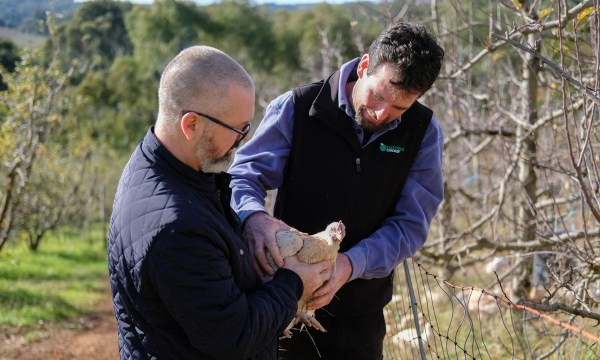
With an entire orchard to roam, the chickens don’t develop into the format to which we are accustomed. Rather than being fed for growth and starved of physical activity, their daily hikes across the Lenswood hillside build them into a very different beast.
“The texture of Carey’s birds are… it’s incredible,” Trent remarks.
“It does have a real texture about it. A lot of chickens, they don’t have that fibrous texture to the meat, and his do, and you can really feel that they’ve been raised in a different way.”
“Realistically, what we’re doing with the chicken is no different to how you would grow a lamb, or beef – whatever. We’re actually raising it. It’s the same thing,” Carey says.
The obvious benefit of this farming practice is the experience for diners at 2KW, as outlined above; however, as we move through the orchard, Carey points out the effect the chickens have had on the soil.
In a section where the chickens have roamed, there are long and lush clumps of grass, but in the adjacent line of trees, where the chickens are yet to graze, the pasture is thinner.
“Definitely the nutrient value is strong. If it can do that with the grass, it’s healthy,” Carey says.
“We’ve always used chicken manure, which we’d buy in. It’s a lot easier with the truck coming in and spreading it, but we’re organic certified [and] what the chickens put down can only be what we put into the chickens, so if we put in clean food… then we’ve got clean chickens, we’ve got beautiful meat, we’ve got the add-ons with the fruit.”
“Do you see a change in the fruit?” Trent asks.
“Yeah, very much so. We aim for that.”
“Are there other apple growers around Australia doing the same thing?”
“No, the only reason we can do this safely with the birds is because it’s certified organic. Because otherwise they’re always weed spraying, or doing something in the conventional orchards.”
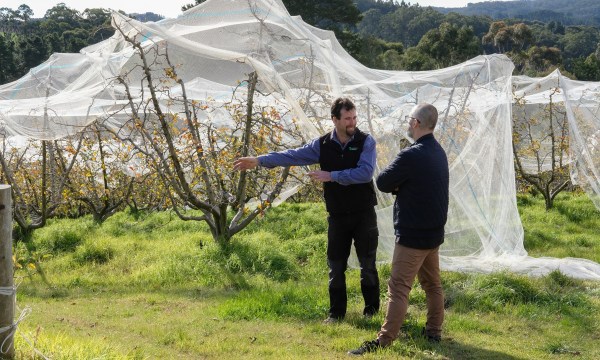
Being familiar with this side of the hospitality industry is important to Trent; a lot of the hard yards are done before any produce gets to the kitchen, he says, and so a chef needs to hold a great amount of respect for growers and producers. This is a culture he also fosters in his kitchen team.
The relationship between 2KW and Nature’s Chickens started before Trent took the head chef position, but the friendship has led to further collaboration.
After Carey’s son brought home some day-old ducks for a high school home project, the potential for another poultry offering became apparent. He floated the idea of producing ducks with Trent, to which the reply was, “’I’ll take them all,’” Carey laughs.
With closer ties to industry, Trent’s menus at 2KW will continue to truly reflect the seasonality of the regions that feed his kitchen, and while that term might be prone to overuse in conversations around food and beverage in the current era, it’s certainly not to be dismissed as a trivial concept.
“I love that [seasonality]. I prefer that way of creating dishes and doing menus, just responding to what the farmers are doing and where they’re at,” Trent says.
“We’re working with Fair Fish SA. I’ve got a fisherman, he calls me up every Monday and goes ‘I’m going out fishing tomorrow, I’ll let you know what I’ve caught,’ and the next day I go and physically pick it up from the depot and bring it into 2KW and we use that fish.
“If that system’s in place, and [customers] are getting a fish that was caught yesterday, it doesn’t get much better.
“We need to be really quick, and creative, and innovative… do you know what I mean? And don’t be so structured and go ‘There’s only four menu changes a year.’ What does that mean? Does it actually work that way? I just think that it should always be evolving, reflecting nature.”



